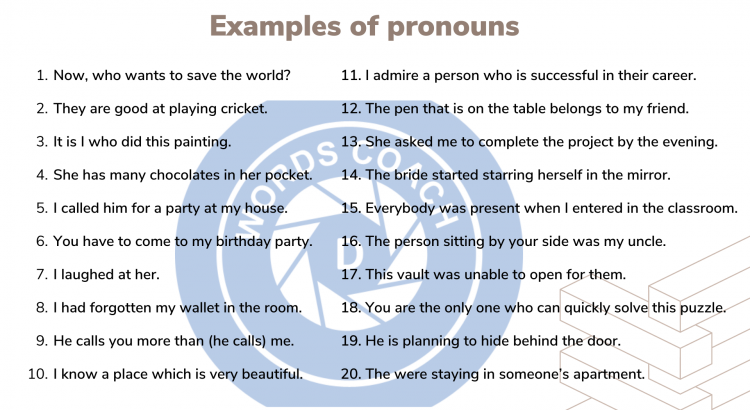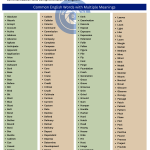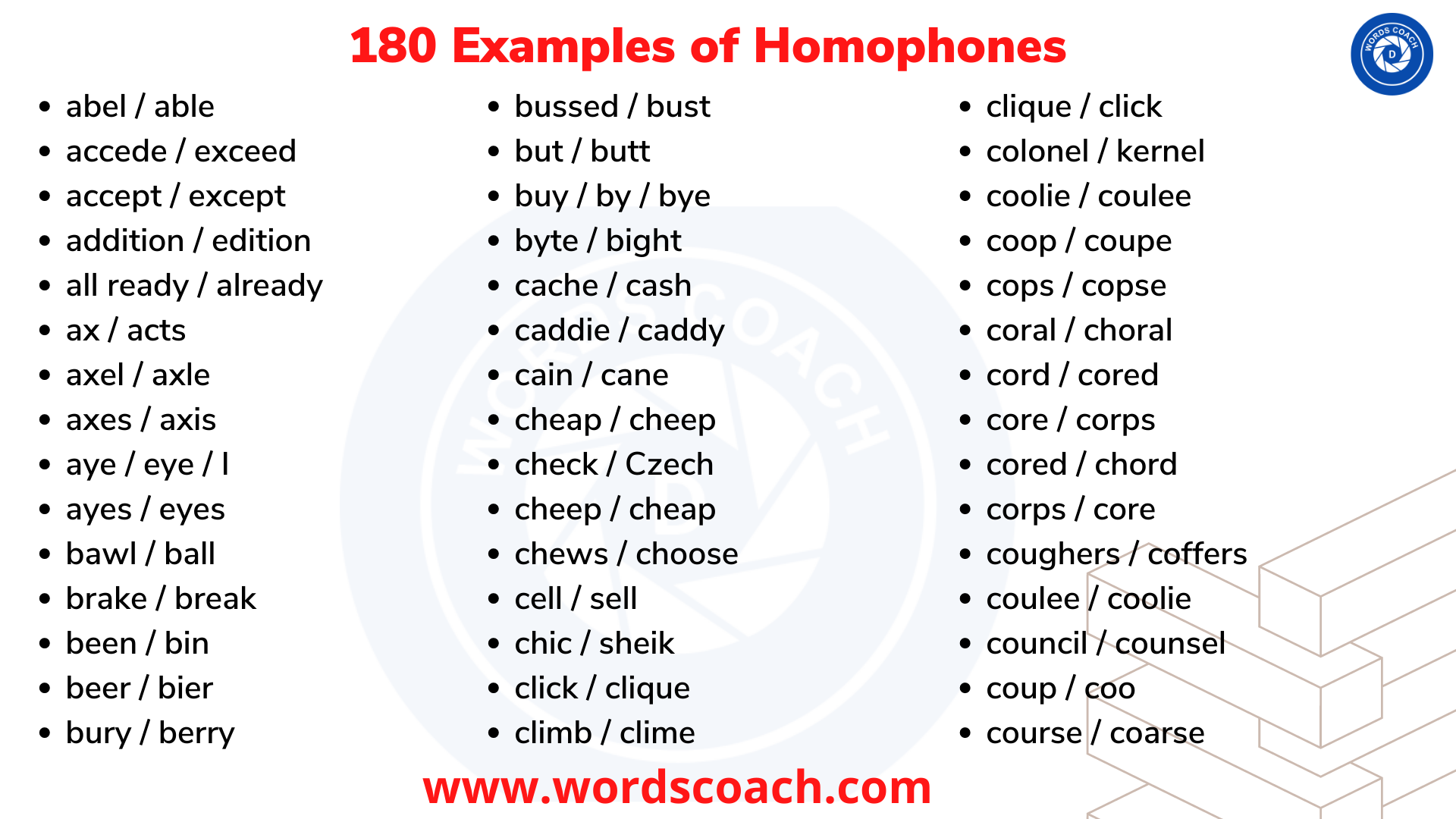Examples of pronouns
What is a Pronoun?
A pronoun is a word that stands in a place of a noun. Pronouns are one of the eight parts of speech. A different pronoun is required relying on the noun being replaced and the function that the noun has in the sentence. It is generally used to avoid the repeated use of nouns. Pronouns have different forms for the different ways of using it.
Below is the list of 6 various kinds of pronouns
- Personal Pronouns
- Relative Pronoun
- Indefinite Pronoun
- Demonstrative Pronoun
- Reflexive Pronoun
- Emphatic Pronoun

Examples of pronouns
- He is doing homework.
- They are good at playing cricket.
- It is I who did this painting.
- She has many chocolates in her pocket.
- I called him for a party at my house.
- You have to come to my birthday party.
- I laughed at her.
- I had forgotten my wallet in the room.
- He calls you more than (he calls) me.
- I know a place which is very beautiful.
- I admire a person who is successful in their career.
- The pen that is on the table belongs to my friend.
- I first saw her in New York where I lived for three months.
- She asked me to complete the project by the evening.
- The bride started starring herself in the mirror.
- Everybody was present when I entered in the classroom.
- The person sitting by your side was my uncle.
- This vault was unable to open for them.
- You are the only one who can quickly solve this puzzle.
- He is planning to hide behind the door.
- Only those students are applicable to join the contest.
- Everything will be fine. you have to calm down.
- His son has been kidnapped.
- There is nothing to hide from you.
- I have seen all those pictures you sent to me.
- You all have to come to my sister’s wedding.
- I called you yesterday to join us for the party.
- Someone, Please call the Ambulance.
- Everyone wants to Improve yourself.
- Everyone needs time to unwind.
- We finally moved to another city.
- The were staying in someone’s apartment.
What is your English level?
Take our short English test to find out.
Types of Pronouns with Examples
There are several types of pronouns, each serving a different function in a sentence. Let’s explore the major types with examples.
Personal Pronouns
Personal pronouns refer to specific people or things and can be subjective, objective, or possessive.
- Subjective (used as the subject of a sentence):
- I, you, he, she, it, we, they
- Example: She is going to the library.
- Objective (used as the object of a sentence):
- me, you, him, her, it, us, them
- Example: The teacher gave us a lesson.
- Possessive (show ownership or possession):
- mine, yours, his, hers, its, ours, theirs
- Example: The book is hers.
Reflexive Pronouns
Reflexive pronouns are used when the subject and the object of the sentence are the same person or thing.
- Pronouns: myself, yourself, himself, herself, itself, ourselves, yourselves, themselves
- Example: He hurt himself while playing soccer.
Demonstrative Pronouns
Demonstrative pronouns point to specific things or people. They are used to indicate or demonstrate something.
- Pronouns: this, that, these, those
- Example: This is my favorite book.
Interrogative Pronouns
Interrogative pronouns are used to ask questions.
- Pronouns: who, whom, whose, which, what
- Example: Who is coming to the party?
Relative Pronouns
Relative pronouns introduce relative clauses and connect them to the main sentence.
- Pronouns: who, whom, whose, which, that
- Example: The girl who won the race is my friend.
Indefinite Pronouns
Indefinite pronouns refer to nonspecific people or things.
- Pronouns: someone, anyone, everyone, nobody, something, everything, nothing, each, both, many, few, several
- Example: Everyone enjoyed the concert.
Possessive Pronouns
Possessive pronouns show ownership and replace possessive nouns.
- Pronouns: mine, yours, his, hers, its, ours, theirs
- Example: The house is theirs, not ours.
Reciprocal Pronouns
Reciprocal pronouns indicate a mutual action or relationship.
- Pronouns: each other, one another
- Example: The teammates helped each other during the game.
Examples of Pronouns in Sentences
Here are some common examples of pronouns used in different contexts:
- Subjective Pronouns:
- I went to the store.
- They are playing soccer.
- Objective Pronouns:
- The teacher saw them at the mall.
- Can you help me with this project?
- Possessive Pronouns:
- The bag is mine.
- Is this your car?
- Reflexive Pronouns:
- She prepared herself for the exam.
- We enjoyed ourselves at the party.
- Demonstrative Pronouns:
- These are the keys to the house.
- That was an amazing experience.
- Interrogative Pronouns:
- What is your favorite color?
- Whose book is this?
- Relative Pronouns:
- The house that Jack built is large.
- The person who called is waiting outside.
- Indefinite Pronouns:
- Somebody left their jacket here.
- Few people attended the event.
Why Are Pronouns Important?
Pronouns play a critical role in effective communication. Here are a few reasons why they are so important:
- Avoids Repetition: Pronouns prevent the overuse of nouns in a sentence, making speech and writing more concise and fluid.
- Without pronoun: Jane went to Jane’s house because Jane forgot Jane’s keys.
- With pronoun: Jane went to her house because she forgot her keys.
- Improves Clarity: Pronouns help clarify relationships between people and things in a sentence, making it easier for the listener or reader to follow.
- Maintains Flow: Using pronouns keeps conversations and writing from becoming cumbersome or awkward. It makes communication smoother and more natural.
Common Mistakes with Pronouns
Using pronouns incorrectly can lead to confusion. Here are some common mistakes and how to avoid them:
- Ambiguous Pronoun Reference: Ensure that the pronoun clearly refers to a specific noun.
- Incorrect: When the boy met his friend, he smiled. (Who smiled, the boy or the friend?)
- Correct: When the boy met his friend, the boy smiled.
- Pronoun Agreement: Pronouns must agree in number (singular or plural) with the noun they refer to.
- Incorrect: Everybody forgot their keys. (Everybody is singular, so the pronoun should also be singular.)
- Correct: Everybody forgot his or her keys.
Pronouns are small words with a big impact. By using them correctly, you can make your speech and writing more fluent and less repetitive. Whether you’re engaging in a conversation, writing an essay, or just practicing your English, pronouns help make communication clear and efficient.
Practice using different types of pronouns in sentences to improve your understanding and ability to communicate effectively!






Things used to be like that, unfortunately different elements made sure they wouldnt stay that way. Congrats on the article 😉
This is a attention-grabbing post by the way. I am going to go ahead and bookmark this post for my sis to check out later on tonight. Keep up the superior work.
I thought it was gonna be some boring old publish, but it in truth paid out for my time. I will article a link to the page in my weblog. I am sure my personal guests will unearth that invaluable. . . .
This domain seems to recieve a great deal of visitors. How do you advertise it? It offers a nice individual spin on things. I guess having something useful or substantial to post about is the most important thing.